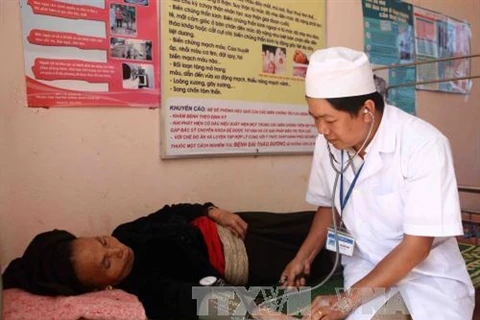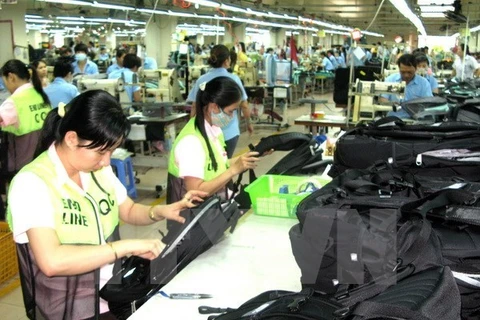 A photo taken from the command-economy period shows a long line of people queueing up to get vegetables. (Photo: VNN)
A photo taken from the command-economy period shows a long line of people queueing up to get vegetables. (Photo: VNN) Hanoi (VNA) – The 30-year Doi Moi (Renewal) period has been a critical period in the country’s development, featuring a profound and comprehensive transformation and a huge revolutionary cause undertaken by the entire Party and people towards the goal of a strong nation where people enjoy wealth, democracy, justice and a civilised lifestyle.
Accomplishments, shortcomings, lessons and experience learnt from the process over the past three decades have been summed up by Associate Professor Dr. Nguyen Viet Thong, Secretary General of the Central Theoretical Council.
The 30-year reform has allowed the country to rise up from socio-economic crisis and underdevelopment to become a middle-income country that is pursuing industrialisation, modernisation and extensive international integration, he said.
High economic growth has enabled the formation and development of a socialist-oriented market economy. Socio-political stability has been achieved while defence and security has been reinforced. Cultural life has developed and people’s living standards have improved. Socialist democracy has been promoted and national unity has strengthened.
The building of the Party, the rule of law and the entire political system has been intensified. The nation’s strength has been consolidated and its independence, sovereignty, unity, territorial integrity and socialist regime have been firmly defended.
Expanded external relations have heightened the country’s position and reputation on the international stage, Thong stressed.
These achievements have laid out an important premise for the country to press ahead with reforms and proved that the path to socialism is the right direction for the country.
Thong attributed the success to the Party’s sound, creative reform guidelines, which he said met the people’s interests and aspirations and gained their enthusiastic support and response.
He said the Party has applied and developed creatively Marxism-Leninism and Ho Chi Minh’s ideology while upholding national traditions, absorbing cultural influences and utilising international experience.
The Party has maintained political firmness, persisted in the ideology and goal of national independence and socialism, and responded promptly to local and global changes with appropriate policies and guidelines.
The reform process has been positively approved and implemented by people from all walks of life and earned the support, assistance and cooperation from international friends, he emphasised.
However, that journey had its limitations and problems and has not been thoroughly summarised to highlight problems that have arisen. Several issues pertaining to the country’s theory of socialism and its path moving forward needed more explanation.
According to the official, the economy has fallen far short of its potential given the resources at its disposal.
Over the last decade, the macro-economy has been unstable, facing declining growth and slow recovery. Labour quality, efficiency, productivity and national competitiveness remain low. Unsustainable development took place across economics, culture, social affairs and the environment.
Pressing social issues have yet to be fully acknowledged and addressed, sparking the emergence of factors and risks that could disturb social stability. There are a proportion of people who have not benefited fairly from reforms, Thong said.
The capacity and operational efficiency of the political system have not been strong enough to accomplish assigned tasks while the creation of a foundation for the country to become a modern and industrial country has fallen short of expectations.
The dangers named at the Party’s mid-term seventh national congress in 1994, including the “peaceful evolution” by hostile forces and the so-called “self-evolution” and “self-transformation” within the Party, still remained. Confidence in the Party and the regime has declined.
There were objective and subjective reasons behind these limitations, Thong pointed out.
According to the official, the renewal process was an unprecedented, huge, comprehensive, time-consuming, complicated, and difficult cause that was carried out under adverse regional and global conditions and fiercely attacked by hostile forces and political opportunists.
Meanwhile, due attention has not been given to theoretical research and the summarisation of the reform process. Changes in mindset have failed to keep up with reality. Forecasts remained inaccurate, affecting the quality of national decisions, policies and guidelines issued by the Party.
The methods used to implement Party guidelines and resolutions and State policies and laws have their limitations. The authority and responsibility of the heads of state offices have yet to be clarified and a mechanism to manage power remains absent.
Many policies and resolutions have not been enforced while outdated policies have not been fixed or amended, Thong said.
Managing and educating State officials and Party members, especially key managers, in terms of political ideology, virtues and lifestyle have not been given proper attention. This has led to a failure to form a consensus regarding ideology, will and actions within the Party when dealing with complicated situations.
Thong also referred to the failure to develop mechanisms and policies to attract talented people to help with national development.-VNA






















